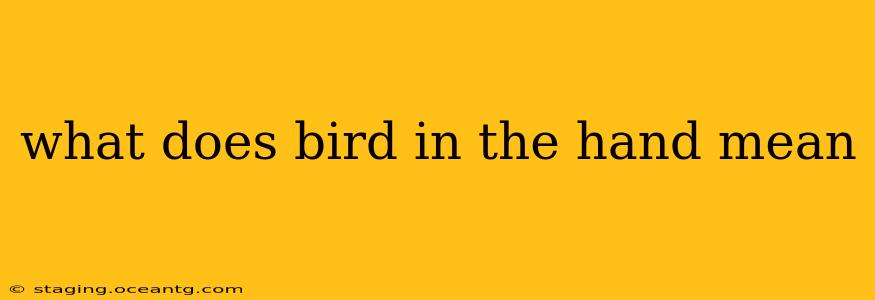The proverb "a bird in the hand is worth two in the bush" is a common expression advising us to appreciate what we already possess rather than risk losing it by pursuing something potentially better but less certain. It speaks to the value of certainty and the potential pitfalls of ambition. Let's delve deeper into its meaning and explore some related questions.
What is the Origin of the Proverb?
While the exact origin is debated, the proverb's core concept has ancient roots. Similar sentiments appear in various cultures and time periods. One early recorded instance comes from a 16th-century collection of proverbs by John Heywood, where a slightly different version appeared. Over time, the phrasing has evolved into its current, more concise form. The essence, however, remains constant: security versus risk.
What Does "Bird in the Hand" Symbolize?
The "bird in the hand" represents something you already have – a possession, opportunity, or advantage. It’s tangible, real, and secure. This could be a job offer, a current relationship, a financial investment, or anything of value in your life. The security of having it is emphasized.
What Does "Two in the Bush" Symbolize?
Conversely, "two in the bush" represents potential gains, but with a high degree of uncertainty. These are aspirations, hopes, or opportunities that are not yet realized. They hold the promise of something potentially better, but also the substantial risk of gaining nothing. The pursuit of these "two birds" might lead to losing the one already secured.
Why is Certainty More Valuable Than Potential?
The proverb highlights the psychological value of certainty. The fear of loss, or even the possibility of losing something currently held, often outweighs the potential reward of something uncertain. Human nature tends towards risk aversion, preferring a guaranteed outcome, even if smaller, over a gamble with a potentially larger but uncertain reward.
Are There Situations Where It's Not Wise to Hold Onto What You Have?
While the proverb is a sound guideline, it’s not an absolute rule. There are circumstances where pursuing a greater opportunity, even with inherent risk, is justified. If the potential reward significantly outweighs the current possession, and the risk is calculated and acceptable, then abandoning the "bird in the hand" might be a rational choice. This is especially true in situations with high growth potential, where the potential gains greatly eclipse the losses from failure.
When Should I Apply the "Bird in the Hand" Principle?
The proverb is most applicable when:
- The potential gain is not significantly larger than the current possession. If the difference is marginal, it's better to secure what you already have.
- The risk of failure is high. If the chances of losing your current possession and failing to acquire the new one are significant, it’s wiser to stay with the certainty you have.
- The potential loss is too great. Consider the downside. If losing what you already have would cause significant harm, sticking with the certainty of your "bird in the hand" is the safest strategy.
Ultimately, the proverb serves as a reminder to carefully weigh the risks and rewards before abandoning something certain in pursuit of something uncertain. It encourages careful consideration and a balanced approach to decision-making.
